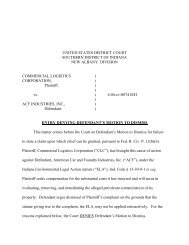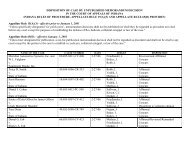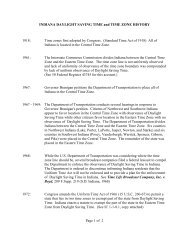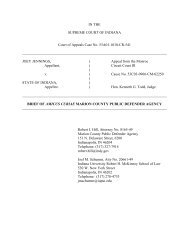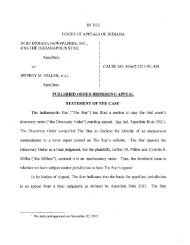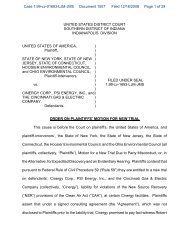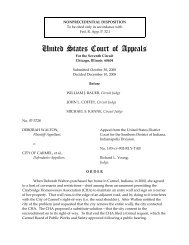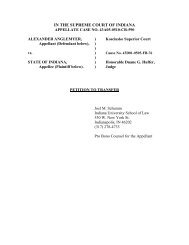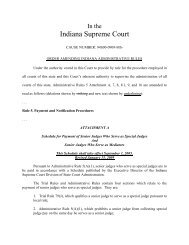Richard L. Barnes v. State of Indiana
Richard L. Barnes v. State of Indiana
Richard L. Barnes v. State of Indiana
You also want an ePaper? Increase the reach of your titles
YUMPU automatically turns print PDFs into web optimized ePapers that Google loves.
Citing Robinson, the <strong>State</strong> argues that the instruction should not have been given<br />
because a defendant may not resist unlawful entry by battering a police <strong>of</strong>ficer. In<br />
Robinson, police <strong>of</strong>ficers responding to a 911 call <strong>of</strong> a possible domestic disturbance,<br />
refused to leave the premises after Robinson told them to leave.<br />
When an <strong>of</strong>ficer<br />
attempted to come onto the porch <strong>of</strong> the residence, Robinson pushed the <strong>of</strong>ficer <strong>of</strong>f <strong>of</strong> the<br />
porch. Robinson appealed his conviction for battery on a law enforcement <strong>of</strong>ficer, and<br />
we concluded that Robinson‟s act <strong>of</strong> pushing the <strong>of</strong>ficer <strong>of</strong>f <strong>of</strong> his porch was not<br />
reasonable resistance. 704 N.E.2d at 708. Specifically, we stated “[t]he right to<br />
reasonably resist an unlawful entry does not include the right to commit a battery upon a<br />
police <strong>of</strong>ficer.” Id.<br />
However, our court also stated: “there can be a fine line between reasonable<br />
resistance and battery, but that is for the jury to resolve.” Id. at 709 (emphasis added).<br />
Therefore, whether <strong>Barnes</strong>‟s act <strong>of</strong> shoving Officer Reed out <strong>of</strong> the doorway <strong>of</strong> his<br />
apartment was battery or “reasonable resistance” is a fact question for the jury to resolve.<br />
Importantly, <strong>Barnes</strong>‟s theory <strong>of</strong> defense concerning the battery and resisting law<br />
enforcement charges was the right to resist unlawful entry into his apartment. See Tr. pp.<br />
11-12, 210-12. The jury would have been properly informed <strong>of</strong> <strong>Barnes</strong>‟s right to<br />
“reasonably resist” Officer Reed‟s unlawful entry if the instruction had been given.<br />
Because the evidence supported the giving <strong>of</strong> the instruction, and <strong>Barnes</strong>‟s theory <strong>of</strong><br />
defense had some foundation in the evidence, the jury‟s decision may have been different<br />
had it received <strong>Barnes</strong>‟s tendered instruction. For these reasons, the fact that the jury was<br />
not instructed on this particular defense cannot be said to be harmless error. <strong>Barnes</strong> is<br />
8



